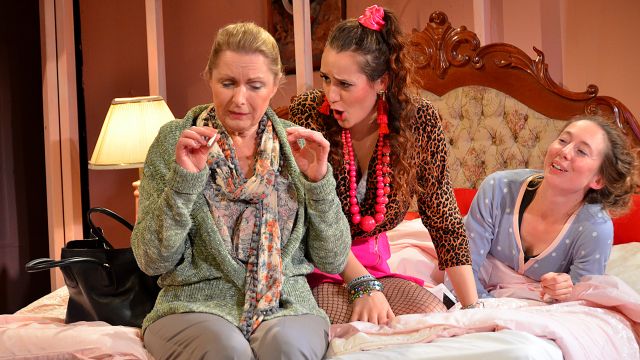The Memory of Water
This Olivier Award winning play by English writer and actress Shelagh Stephenson is set in a remote northern coastal village, presumably Yorkshire, in the family home of three sisters, Teresa, Mary and Catherine. The death of their mother, Vi, has forcibly brought the siblings back to the place in which they grew up as they prepare for her funeral and the sale of the house. It’s a well-worn theme that has also been explored by Australian playwrights, such as Louis Nowra in Radiance and Hannie Rayson in Hotel Sorrento.
The intimacy forced on the three by sheer proximity brings about reminiscences of times past and moments shared. However, as is often the case, the memories are fluid, where one sister remembers “sunshine and bicycles” while another is adamant she never had a bicycle and life was lived under gloomy skies.
Teresa, the eldest sibling, is a control freak who has martyred herself to looking after her mother in the lead up to her demise and is happy to continually remind her younger siblings of her sacrifice. Jenny Allan deftly portrays her as a highly neurotic woman with a reliance on “rescue remedy” when the going gets tough.
Catherine, the youngest sibling, is a pot smoking party girl who longs for love but can’t keep hold of it. Laura Antoniazzi gives Catherine an annoying shrillness and extravagance that, whilst sometimes grating to watch, does reinforce the characters’ need for attention.
 As Mary, Cheryl Douglas is the lynch pin of the piece. She is the middle child, a successful doctor and the most grounded of the three siblings, even though she is harbouring a deep sadness. Miss Douglas brings a strong dignity and poise to the character, even whilst her siblings are creating chaos about her.
As Mary, Cheryl Douglas is the lynch pin of the piece. She is the middle child, a successful doctor and the most grounded of the three siblings, even though she is harbouring a deep sadness. Miss Douglas brings a strong dignity and poise to the character, even whilst her siblings are creating chaos about her.
Mary’s scenes with her dead mother, played with a level of self-absorbed detachment by Madeleine Marin, reinforce the idea that memories are not the same for all the people involved in their creation. These spectral moments are beautifully lit by Richard Parkhill.
The sisters and their mother all experience differences in recollection that build tensions. Director Geoff Brittain employs these as a vehicle for hilarity in the first act, but they ultimately hide deeper secrets and upsets which are brought to the fore in a darker, more tragic second act.
The male characters, both the seen and unseen, are minor counterpoints to the stronger female characters and none of them are particularly endearing. Mike, Mary’s lover as played by Mark Healy, seemed almost too good-hearted and could have been more outwardly attentive to the attention of needy Catherine to drive home the character’s predilection for philandering.
Stuart Pearce is strong as Teresa’s bored and long-suffering husband Frank, portraying him as a man of few words, a long-suffering man, but one of great loyalty, who longs for nothing more than pulling a pint in a pub of his own.

All of the action takes place in the dead mother’s age-worn millennial pink bedroom in the midst of a harsh Yorkshire winter. The set has been designed by Ole Wiebkin who seems to have been unable to decide whether to go with realism or minimalism in his design. On the one hand he has incorporated the detail of the two-up two-down staircase, snow encrusted windows and shingled roof top, yet on the other he has stopped at a stud wall frame to encapsulate the bedroom and then decided it needed the realism of a light switch which has been connected mid-air by three pieces of wire. The window with the fluttering net curtains gently blowing in the breeze was another minor annoyance; who would actually leave the bedroom window open in the middle of a snow storm I wonder?
Overall this is a very entertaining, albeit long night (at about two and half hours) at the theatre. Geoff Brittain has done a commendable job of directing this piece with a solid cast. The first act was played for laughs leaving the second act to feel a little bogged down by some of the more tragic aspects of the play. Allan, Douglas and Antoniazzi have a good on-stage rapport and are very engaging as the three siblings, with the only shortcoming being that on the opening night their accents were unevenly matched.
This play is as much a reminder to hold your loved ones close as it is a play about how memory, perceived or otherwise, can shape our future. As Mary points out, “my mother…goes through us like wine through water. Nothing ends entirely”.
Jenny Fewster
Subscribe to our E-Newsletter, buy our latest print edition or find a Performing Arts book at Book Nook.

